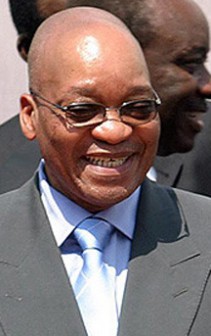JOHANNESBURG, (Reuters) – South Africa’s parliament passed a bill on protecting state secrets yesterday despite criticism at home and abroad that it harks back to apartheid legislation and makes it easier for corrupt officials to conceal graft.
The Protection of Information Bill allows any government agency to apply for classification of information that is “valuable” to the state and criminalises the possession and distribution of state secrets.
Critics say the bill harms the nation’s weakened credibility on tackling corruption and intimidates those who try to expose it. The ruling African National Congress said the bill, passed with a vote of 229 in favour and 107 against, is essential for protecting state information and keeping spies at bay.
The press has criticised the legislation as an attempt to silence whistleblowers and muzzle investigative journalists, who now face up to 25 years in jail for revealing state secrets.

Many South Africans wore black to protest against the bill, saying it was reminiscent of apartheid-era censorship laws. The bill’s passage briefly weakened the rand, with investors saying the vote dampened sentiment. A joint editorial in the country’s largest newspapers on Tuesday called the vote South Africa’s “day of reckoning for democracy”.
“The spreading culture of self-enrichment, either corrupt, or merely inappropriate, makes scrutiny fuelled by whistleblowers who have the public interest at heart more essential than ever since 1994,” the front-page editorial said.
The bill has a broad definition of valuable information and gives great authority on classification to State Security Minister Siyabonga Cwele, who faced calls for his resignation after his wife was convicted in May of running an international drug ring and he said he was unaware of her criminality.The measure coincides with concerns about growing cronyism in the ANC government and a downgrade of South Africa’s outlook by ratings agency Moody’s, which said this month that it was worried about increasing government interference in Africa’s largest economy.
“It is a significant move away from the liberal ideals that characterised the early days of the ANC government,” said Razia Khan, head of Africa Research at Standard Chartered in London.
“With all the negatives typically associated with ruling parties that hold ‘too much power’ – this legislation will only help to cement investor fears that a potential tipping point has been reached,” Khan said.
The bill needs to go through a few procedural steps before being implemented.
CORRUPTION
The Nelson Mandela Foundation said it was “concerned” about the bill while Desmond Tutu, a Nobel Peace Prize laureate, said “the law will do our people and our country a disservice”.
South Africa, under ANC control since the end of white-minority apartheid rule in 1994, has slid in the Transparency International gauge of perceived corruption from 38th in the world in 2001 to 54th in 2010.
Transparency International said yesterday that about 60 percent of respondents in a survey said corruption had increased under President Jacob Zuma while 12 percent said it had dropped.
“This bill will unstitch the very fabric of our constitution. It will criminalise the freedoms that so many of our people fought for,” opposition Democratic Alliance parliamentary leader Lindiwe Mazibuko told the assembly, adding the party will challenge the measure in court.





